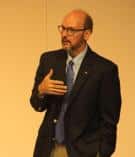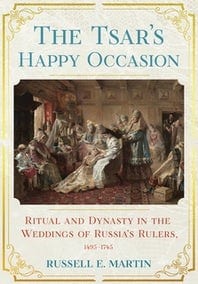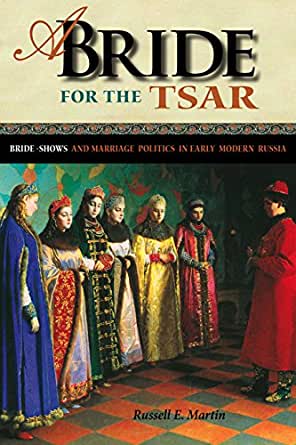
Russell Martin
Professor of History, Westminster College
When did you first develop an interest in Slavic, East European and Eurasian Studies? [feel free to describe your career path more broadly]
As with most things for me, it all goes back to my background. I was raised in a family that took both religion (something to debate and “do”) and music (something to perform and appreciate) pretty seriously. My mother was from a virtual dynasty of church servers in Galicia (Western Ukraine), and my grandfather immigrated with his wife and the first of their children (they would eventually collect eleven, some born in a village called Rip’iana, some here) to the US before the First World War. They were Russophiles—at least some of them were—and that meant I was exposed from an early age to Russian history and the Ukrainian language at the dinner table, and to music and Orthodoxy on feast days and Sundays. It was for me a very difficult decision, whether to pursue music or history as I was preparing to go to college. Following in the path of one of my older brothers, I chose music. But by the beginning of my sophomore year I was convinced I made the wrong choice and switched majors and universities. Both potential futures, however, were presented to me at the dinner table, as (maternal) aunts and uncles regaled us with stories of the “old country,” as a jazz trumpet bellowed out of my brother’s bedroom for hours every day, and as we all reconvened at that dinner table every Sunday after liturgy. I lean on that essential and eclectic background to this day.
What support have you received throughout your career (from ASEEES / other societies / federal support / etc.) that has allowed you to advance your scholarship?
I was very fortunate as a graduate student to receive grants from various governmental funding agencies, including IREX and SSRC, which made researching and finishing the dissertation possible. In fact, I couldn’t have written the kind of archive-dependent dissertation I wrote without these grants, which provided not only funds but all the logistical support one needs to live abroad for a year or more. I try to mention these agencies even now, years later, in my acknowledgements because the debt is ongoing. Westminster College, my current employer, has been very helpful too—so much so that I’ve not applied as often as I probably should have (for CV-development reasons) for research grants. These internal grants support short stints in archives in Russia and copies of documents ordered on site or remotely. So I mention Westminster College in my acknowledgements a lot too.
What is your current research/work project?
After two books on weddings and marriage politics, I’m excited to be moving into something new and different. I’m working on the seventeenth-century Russian intellectual and writer Semen Shakhovskoi (ca. 1585–1653?). Shakhovskoi’s works remain to a certain extent a mystery, which is curious because most scholars are quick to list him as perhaps the single most important writer of his time: the author of historical works, liturgical offices, theological excursuses, an autobiography, some of the earliest extant secular rhymed verse, and a corpus of elegant and linguistically significant letters. My hope is to write more than just an intellectual history, but a synthetic treatment of Shakhovskoi’s ideas, linking him and them to the turbulent events of his times and to the growth of “the modern” in Russia.

What does your ASEEES membership mean to you? How has your involvement with ASEEES helped to further your career?
To me, ASEEES means Slavic Review and the annual conference—which is to say a facilitating “link” to the intellectual community to which I belong. It was a measure of having “made it” to get my first article in Slavic Review, which I still hold up in my mind as the premier journal in our field. The bookshelves lined with red spines give me a sense of connection to colleagues doing allied, if sometimes very different, work in an area of the world I find captivating. The sense of connection and community is reinforced for me every year at the annual conference. Not only the panels, which are reason enough to attend it, but the dinner and drinks afterward with colleagues I get to see only once a year. Like most of my colleagues (I should really say “friends”), I have served on panels nearly every year over the past 25, but the conversations after them—about our work, but also our kids, our families, our institutions (usually a vexing topic), our students—are when the conference fee seems most worth it. ASEEES is my link to the field, my lifeboat from bucolic Pennsylvania, and proof positive—which I need in regular intervals—that Slavic Studies is still alive and well.
How do you envision your current research projects(s) within the broader field of SEEES?
As an early modernist, I ask that question of myself all the time. Presentism affects and distorts all academic fields in the Humanities and all college course catalogs. I see myself as constantly struggling on two fronts: researching themes of intrinsic interest in the historiography of the East Slavic spaces, and promoting the early field in a broader context (beyond ASEEES, beyond Slavic Studies)—a context that seems constantly to want to prioritize the modern. ASEEES has been good to my field in that there is always good representation of pre-modern sessions at conferences and in Slavic Review—though we could always wish for more. And I think that the community ASEEES creates through its conferences and publications (here I also mean NewsNet) produces a genuinely convivial and mutually supportive atmosphere—at least as far as I have seen and experienced. This means for me that colleagues working on Soviet or late imperial topics read my work, share tweets and Facebook posts about it, use it in their classrooms, and help spread the word that we early modernists are still out there, plugging away at it. And I certainly reciprocate. Whatever the trends, Slavic Studies, as measured by the output of ASEEES’s members, is thriving. Would that more deans and hiring committees took note.
Besides your professional work, what other interests and/or hobbies do you enjoy?
My family—my wife and three kids—consumes much of my time and energy when I’m not thinking or writing about “400-year old dead guys,” as my wife puts it. That part of my life supplies all the joy, support, and balance I need to do the rest. But there are other things too: I play cards (euchre and bridge, mostly), I like to hike, to read (of course), to travel to and explore new places (I’ve recently [re]discovered Greece), and I’ve recently taken up sailing. I also spend time building and admiring my personal library. And we have recreated as best we can the dinner table of my youth, so that what was conveyed to me can be passed on at least one more generation.
